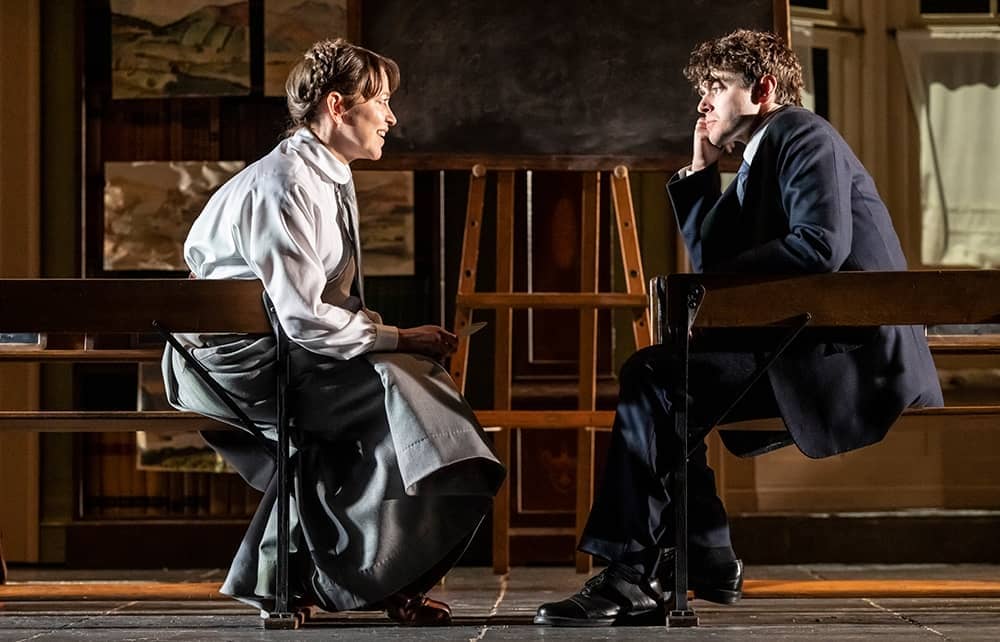The Corn is Green by Emlyn Williams is a sociology essay written in 1938 about a prickly tyrant, Miss Moffat, who tries to civilise Wales by setting up a village school where sooty-faced miners are taught to read and write. Miss Moffat is an unmarried English layabout who has money to burn and time on her hands and so, of course, she wants to ‘help’. You know the type? Director Dominic Cooke treats the script as a period joke and the actors are encouraged to mock their characters mercilessly. Hoots of cheap laughter echo around the theatre.
The show is presented very weirdly as a sort of botched technical rehearsal with lots of clunky sound effects and a Writer/Narrator on stage who paces about and shouts directions at the actors. This tricksy effect becomes very tiresome very quickly. And the playing area is cluttered with a choir of unwashed male stalkers who spend their time ogling Miss Moffat and bursting into song. The actors fight back against the choir by screaming their lines at top volume and trying to drown out the barber-shop harmonies. It’s all very muddled in a drama that calls for simplicity.
The actors mock their characters mercilessly. Hoots of cheap laughter echo around the theatre
The ill-drawn characters are a heap of platitudes and improbabilities. We meet Bessie, the tart with a heart, whose mother is not just a self-confessed kleptomaniac but also a senior member of the Salvation Army. There’s a blonde special needs teacher, Miss Ronberry, who seems smitten by the village Squire although their romance comes to nothing. The Squire is a thick-as-mince millionaire from Cambridge, (‘so stupid he wears it like a halo’), whose witticisms include ‘all work and no play makes Taffy a dull boy’. His chief purpose is to invite us to laugh at the low calibre of Cambridge graduates because the playwright went to Oxford where he took a first in snobbery.
Nicola Walker, a TV celebrity, plays the charmless Miss Moffat who describes herself, rather cruelly, as a ‘thwarted spinster’. With her range of talents, she’d be better off training sea lions or running a concentration camp than managing a school full of hunchbacked Welsh hobbits. One of the illiterates at the Early Learning Centre tries to harass her sexually. ‘Miss? Give us a kiss,’ he cries. She bends him over her knee and spanks him with a rolled-up copy of the Treaty of Versailles. Later, she orders her class of cloth-capped subhumans to write a page of autobiography and she discovers a literary genius, named Evans, whose talent is so dazzling that he could one day rival Shakespeare. But Evans is a tormented misfit, a beer-swilling womaniser who spends his time sinking pints and bedding wenches. Can Miss Moffat persuade the boozy boy wonder to quit the drink and study enough Burke and Rousseau to get him through the Oxford entrance exam? Maybe the stupid Squire can help because his brother happens to be a fellow at Magdalen who might be persuaded to wangle the genius a scholarship.
It sounds gripping, up to a point, but the writer’s limited facility pushes him towards caricature and away from the complexities of real human beings. In Act One, Evans can barely grunt his own name. In Act Two, after a day trip to Oxford, he glides around in natty tweeds and discusses political philosophy in a Hugh Grant accent. This is not a great play and it’s presented as a larky excuse to mock stereotypes that died out 70 years ago. What’s the point? If a script is good, do it properly. If it’s bad, do a script that’s good.
Wolf Cub is a bracing, fast-paced monologue that opens in the early 1980s with a lonely teenager, Maxine, whose neglectful father is unaware that she prowls the woods at night and cultivates an alter ego as a she wolf. Psychologically this is acute. Maxine is a penniless scrapheap kid but she’s blessed with intelligence and ambition, and she naturally identifies with a powerful forest predator. In a slightly obscure passage, she shoots her father dead and the killing is covered up. Then she gets hauled off to Nicaragua by a gang of coke-traffickers who introduce her to the import-export trade. Riches fall into her lap. She returns to LA and starts cooking up crack with her boyfriend. ‘Crack is the greatest thing ever to happen to the American poor,’ she gloats.
The story is cleverly integrated with the major political events of the 1980s and 1990s: the Iran/Contra affair; the Rodney King trial, the LA riots and the Landers earthquake of 1992 are used to spring a series of surprises. Maxine is dumped by her boyfriend and chased by the cops but she’s protected by her inner wolf. The show will appeal to anyone born in the 1960s or earlier. Those of a later vintage may find it harder to unravel.







Comments